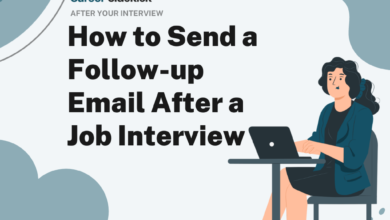دليل المُحَارِب لإرسال رسائل شكر مثالية بعد المقابلات: كيف تترك انطباعًا لا يُنسى!

It looks like you’ve shared a comprehensive guide on how to write a thank-you email after an interview, including examples, common mistakes to avoid, and tips for following up. Here’s a concise summary of the key points:
Key Points for Writing a Thank-You Email After an Interview
- Timing: Send your thank-you email within 24 hours of the interview to keep your interaction fresh in the interviewer’s mind.
- Customization: Personalize your message by referencing specific topics discussed during the interview or something unique about the company that excites you.
- Length: Keep it concise—aim for 85 to 150 words—to respect the recipient’s time while still conveying your appreciation and interest.
- Follow-Up: If you don’t hear back within five days after sending your thank-you note, consider sending a polite follow-up email expressing continued interest in the position.
- Professionalism: Use a formal greeting and maintain a professional tone throughout your message.
- Proofreading: Always proofread for typos or grammatical errors; these can detract from your professionalism.
- Avoid Common Mistakes:
– Don’t use generic templates without customization.
– Avoid being pushy or overly aggressive in follow-ups.
– Ensure each note is tailored if multiple people interviewed you.
Example Structure of Thank-You Email
- Greeting (e.g., “Dear [Interviewer’s Name],”)
- Expression of gratitude (e.g., “Thank you for taking the time to meet with me.”)
- Mention something specific from the conversation.
- Reaffirm interest in the position and inquire about next steps.
- Offer additional information if needed.
- Closing (e.g., “Best regards,” followed by your name).
Subject Line Suggestions
Use engaging subject lines such as:
- “Thank You for Your Time”
- “Great Meeting You!”
By following these guidelines, you’ll create an impactful thank-you email that reinforces your candidacy and leaves a positive impression on potential employers!It seems like you’re looking for guidance on how to write a thank-you email after an interview, as well as tips on following up and avoiding common mistakes. Here’s a concise summary of the key points:
Writing a Thank-You Email After an Interview
- Timing: Send your thank-you email within 24 hours of the interview.
- Structure:
– Subject Line: Keep it simple (e.g., “Thank You for the Opportunity”).
- Greeting: Address the interviewer by name.
- Express Gratitude: Thank them for their time and mention something specific from your conversation that you appreciated or found interesting.
– Reiterate Interest: Confirm your enthusiasm for the position and how you believe you can contribute to their team.
– Closing Statement: Offer to provide any additional information if needed, and express anticipation for next steps.
- Example Template:
plaintext
Subject: Thank You for the Opportunity
Dear [Interviewer's Name],
Thank you for taking the time to speak with me on [Date] about the [Job Title] position at [Company Name]. I enjoyed our conversation about [specific topic discussed], and it was great learning more about your team.
I am very excited about this opportunity, especially because [mention something specific that excites you about the role or company]. I believe my skills in [mention relevant skills/experience] would allow me to contribute effectively.
Please let me know if there is anything else you need from my side. I look forward to hearing from you regarding next steps.
Best regards,
Jane D.
Ph: +11 1111 1111
Website: janedoe.net
Following Up After Sending Your Thank-You Email
- If you haven’t heard back within five days, send a polite follow-up email expressing continued interest in the position and asking if there are any updates regarding your application status.
Common Mistakes to Avoid
- Not Customizing Your Email:
– Personalize each message by referencing specific details from your interview or conversations with different panel members.
- Failing to Proofread:
– Typos can create a negative impression; always double-check your email before sending it out.
- Being Too Pushy or Unprofessional:
– Maintain a friendly tone without sounding desperate; avoid sending multiple follow-ups too quickly.
- Using Generic Templates Without Personalization:
– A cookie-cutter approach can come off as insincere; make sure each note reflects genuine appreciation tailored to that particular interaction.
By following these guidelines, you’ll be able to craft effective thank-you emails that leave a positive impression on potential employers!It seems like you’ve shared a comprehensive guide on how to write thank-you emails after interviews, including examples and common mistakes to avoid. Here’s a summary of the key points:
Key Points for Writing Thank-You Emails After Interviews
- Timing: Send your thank-you email within 24 hours of the interview.
- Personalization: Customize your email by mentioning specific details from the interview, such as:
– Interesting insights about the company or role.
– Responses to particular questions asked during the interview.
– Personal anecdotes shared by the interviewer.
- Structure of Email:
– Start with a greeting and express gratitude for their time.
– Mention something specific you learned or enjoyed during the conversation.
– Reiterate your interest in the position and briefly highlight why you are a good fit.
- Offer to provide any additional information if needed.
- Follow-Up: If you don’t hear back within five days after sending your thank-you email, it’s appropriate to send a polite follow-up message expressing continued interest in the position.
- Email vs. Handwritten Note:
– Generally, an email is preferred due to its immediacy and reliability.
– A handwritten note may be more suitable in traditional industries or for high-level positions where formality is valued.
- Common Mistakes:
– Failing to customize emails can make them seem generic and unengaging.
– Not proofreading can lead to typos that reflect poorly on you.
– Being overly pushy or aggressive in follow-ups can turn off recruiters; maintain professionalism and friendliness instead.
- Examples Provided: The guide includes sample emails for different scenarios (e.g., first interview thank-you, second interview thank-you) which serve as templates that candidates can adapt based on their experiences.
By following these guidelines, candidates can effectively communicate their appreciation while reinforcing their suitability for the role they interviewed for!It looks like you’ve shared a detailed guide on writing thank-you emails after interviews, including examples and common mistakes to avoid. Here’s a summary of the key points:
Key Points for Writing Thank-You Emails After Interviews
- Express Gratitude: Start by thanking the interviewer for their time and the opportunity to discuss the position.
- Reiterate Interest: Confirm your interest in the job and briefly mention why you believe you’re a good fit based on your skills or experiences discussed during the interview.
- Personalize Your Message:
– Reference specific topics discussed during the interview.
– Mention any personal anecdotes shared by the interviewer to create a connection.
– Tailor each email if you interviewed with multiple people.
- Follow Up If Necessary: If you haven’t heard back within five days, it’s appropriate to send a polite follow-up email expressing continued interest in the position.
- Email vs. Handwritten Note:
– Email is generally preferred for its immediacy and reliability.
– A handwritten note may be more suitable in traditional industries or for high-level positions.
- Common Mistakes to Avoid:
– Not customizing your email can make it seem generic.
– Failing to proofread can lead to typos that reflect poorly on you.
– Being too pushy or unprofessional can turn off recruiters; maintain an optimistic tone without overwhelming them with follow-ups.
- Additional Tips:
– Consider sending a digital photo of a handwritten note as an alternative way to stand out.
By following these guidelines, candidates can effectively communicate their appreciation while reinforcing their suitability for the role they are applying for, ultimately enhancing their chances of making a positive impression on potential employers.




